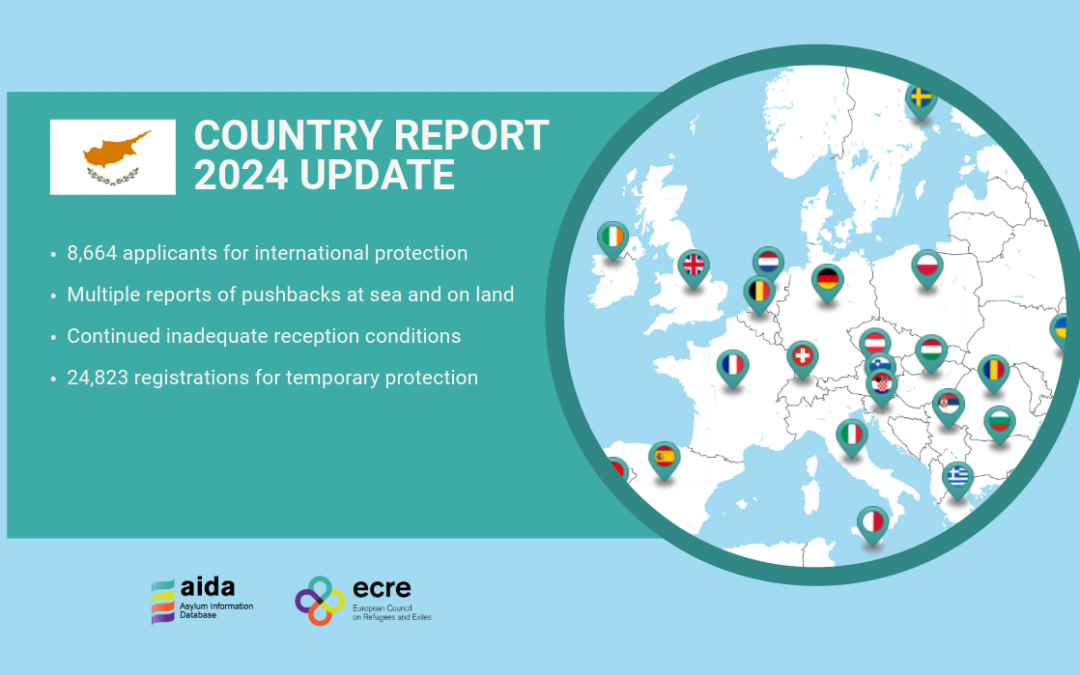|Published on: 15th April 2025|Categories: News|

The updated AIDA Country Report on Cyprus provides a detailed overview on legislative and practice-related developments in asylum procedures, reception conditions, detention of asylum seekers and content of international protection in 2024. It also includes an annex which provides an overview of temporary protection.
A number of key developments drawn from the overview of the main changes that have taken place since the publication of the 2023 update are set out below.
Statistics
- Asylum applications and decisions: 8,664 people applied for asylum in Cyprus in 2024 (10,662 in 2023). Although decisions were issued for 16,103 people, at the end of the year 20,576 people were still awaiting a first instance decision and 6,986 at second instance. The in-merit recognition rate was 38% while the overall protection rate was 23.5%.
Asylum procedure
- Access to the territory: In the first few months of 2024, there were multiple reports of boats carrying people who wanted to reach Cyprus in order to claim asylum being intercepted by Cypriot authorities and subsequently pushed back towards Lebanon from where the people risked forcible return to Syria. In October 2024, the European Court of Human Rights found that Cyprus’s summary return of two asylum applicants to Lebanon had violated their rights under the European Convention on Human Rights. In addition, between May and November 2024, there were also reports of pushbacks at the Green Line which resulted in people being trapped in the ‘buffer zone’ in extremely harsh conditions.
- Suspension of examination of Syrian applications: In April 2024, the government announced that due to an increase in the number of Syrian nationals arriving in Cyprus, the examination of their asylum applications would be suspended. The suspension was still in effect at the beginning of 2025.
Reception conditions
- Reception conditions below adequate levels: Reception standards remained below adequate levels in 2024. Although conditions in the reception centres improved in 2023 and 2024, reception capacity remains low so the majority of asylum applicants live in the community, often in extremely poor conditions.
- Racist attacks: Violence against migrants continued in 2024. Examples included frequent racist attacks, especially against non-EU delivery people; hate speech, police profiling and incidents of police entering private accommodation to identify undocumented people.
- Access to the labour market: Following a five-year period during which access to the labour market was permitted one month after lodging an asylum application, in October 2023, this delay was increased to nine months. In 2024, employers’ associations expressed concern over the possible impact of the nine-month ban on the capacity of businesses to cover their staff needs.
- Insufficient safeguards for children: The number of refugee children (both accompanied and unaccompanied/separated) remains high in Cyprus. There are still gaps in the protection of minors, particularly in the Pournara First Reception Centre (FRC) and some shelters for unaccompanied and separated children. Children remain without adequate guardianship and are thus exposed to various risks, including trafficking and sexual or labour exploitation. In addition, procedures regulating the assessment of a child’s best interests are also lacking.
Detention of asylum seekers
- Statistics on detention: Although the overall number of detained asylum applicants remained low (there were 20 asylum applicants in detention in December 2024), alternatives to detention were still not systematically applied, even in the cases of vulnerable people.
- De facto detention in first registration and reception centre: Asylum applicants in the Pournara FRC continued to experience restrictions on their freedom of movement in 2024 despite there being no legal basis for it. Although the average duration of stay in 2023 and 2024 was shorter than it had been in previous years, it was still much longer than the initially planned 72 hours.
- Detention conditions: Asylum applicants continued to be detained in sub-standard conditions in holding cells in police stations and airports across the country in 2024. They also faced obstacles in accessing asylum procedures and legal remedies to challenge detention and/or rejected asylum applications from those locations.
Content of international protection
- Lack of integration opportunities: The lack of integration opportunities remains a weak point of the Cypriot asylum system. A new integration plan had been finalised but was eventually abandoned. In 2024, there were reports of the integration plan being revised but it has not yet been
- Hardening of naturalisation regulations: As a result of legal amendments that were introduced in 2023, it became extremely difficult for beneficiaries of international protection, including those who were born or grew up in Cyprus, to satisfy the requirements for applying for naturalisation. This continued to be an issue in 2024.
- Family reunification: Access to family reunification remained a lengthy procedure for refugees in 2024. Beneficiaries of subsidiary protection (98% of Syrians present in the country) remain ineligible for family reunification.
Temporary protection
- Statistics: As of 31 December 2024, 24,823 individuals had registered for temporary protection in Cyprus (20,923 as of 31 December 2023).
- Access to rights: Temporary protection holders have access to all rights included in the Temporary Protection Directive upon registration and, in most cases, without obstacles. A small one-off amount is provided for financial support and accommodation options are limited. However, access to the labour market is immediate. Access to education is immediate but with limited support measures.
The full report is available here and the annex on temporary protection is available here.
For more information about the AIDA database or to read other AIDA reports, please visit the AIDA website.

